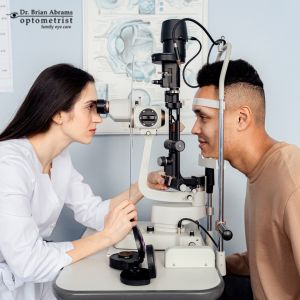In most cases, a headache is an ordinary affliction, often the symptom of stress, dehydration, or lack of sleep, rather than a more serious health issue. However, in some cases, especially when experienced alongside other symptoms, a headache can be indicative of a more serious problem relating to your eye health, requiring an emergency eye exam from a trusted eye doctor. To distinguish an innocuous headache from a more serious one, here are some tips. If you are experiencing any of the following symptoms accompanied by a headache, talk to an experienced optometrist in Vaughan, such as Dr. Brian Abrams, who can help you treat the problem at hand.
Here are some signs that your headache is related to your eye health and when to book an emergency eye exam in Vaughan.
How Are Headaches Connected to Eye Health
Your eyes and brain are closely linked, and when something affects your vision, it can trigger headaches. Straining to see, focusing too hard, or dealing with misaligned vision can cause discomfort that leads to frequent headaches. While some headaches are mild and temporary, persistent or severe headaches may be a sign of an undiagnosed eye condition. To find out if this is the case for you, comprehensive eye exams with Dr. Brian Abrams can help identify the underlying cause. Our team will help diagnose and treat these conditions so you can live more comfortably and protect your eye health.

Signs Your Headache May Be Something More
Alone, a headache is not an immediate cause for concern, but when paired with some of the following symptoms, the best course of action is to see your optometrist in Vaughan for an eye exam.
Look out for headaches that are accompanied by vision loss, vision distortion, light sensitivity, double vision, eye pain, visual halos around the light, or redness around the eye. If you are also experiencing conjunctivitis, frequent squinting, or you’re finding yourself rubbing your eyes more frequently, you should check in with your doctor, especially if you’re having persistent headaches that don’t improve with rest or hydration.
Common Eye-Related Causes of Headaches
Some more common eye conditions that trigger headaches may not require emergency eye care but still require treatment. If you or your child are experiencing any of the following conditions or symptoms, book your visit with Dr. Brian Abrams, a leading optometrist in Vaughan.
- Eye Strain: Digital eye strain from prolonged screen use can cause headaches. With the ubiquity of screens in everyday life, digital eye strain is becoming more and more likely. Factors that advance eye strain include poor lighting, improper viewing distance, and uncorrected vision issues. To mitigate discomfort, book an eye exam and explore our digital eye strain treatment options.
- Uncorrected Refractive Errors: If you’re having trouble seeing near or far, you may find yourself straining your eyes more often, which can fatigue your eyes and actually worsen vision. Nearsightedness (myopia), farsightedness (hyperopia), and astigmatism can lead to headaches. If your vision prescription is outdated or incorrect, your eyes work harder to focus, causing tension headaches. To help minimize the effects of these refractive errors, it’s important to stay on top of your regular visits to the eye doctor at least every two years.
- Dry Eye Syndrome: Insufficient tear production can cause discomfort and blurry vision, whether it’s from increased screen time, exposure to dust, cold weather or other causes. Your body typically tries to compensate for dry eyes by constantly blinking which can lead to irritation and headaches. Your eye doctor may recommend artificial tears or other treatment options to minimize the discomfort of dry eyes.
Serious Causes of Eye-Related Headaches
While some headaches are caused by minor vision issues, others may signal a more serious underlying eye condition that requires prompt medical attention. If you’re experiencing persistent headaches along with changes in your vision, it’s crucial to book an eye exam to determine the cause and prevent further complications.
- Glaucoma: Increased pressure inside the eye, known as intraocular pressure, can damage the optic nerve and lead to vision loss. Acute angle-closure glaucoma, a medical emergency, can cause sudden, intense headaches, nausea, eye pain, and blurred vision. If left untreated, glaucoma can lead to permanent vision loss. Scheduling eye exams regularly is essential for early detection and management of this condition.
- Optic Neuritis: Optic neuritis occurs when the optic nerve becomes inflamed, often due to autoimmune conditions like multiple sclerosis (MS). This inflammation can lead to vision loss, eye pain, and headaches. The condition can worsen without treatment, making early diagnosis critical. If you’re noticing symptoms of pain when moving your eyes, vision loss, and loss of vibrancy in colours with headaches, talk to your eye doctor sooner rather than later.
- Retinal Migraine: While this a rare condition, it is a serious issue as retinal migraines can cause temporary vision loss or visual distortions, followed by a severe headache. It’s caused by reduced blood flow to the retina and can be linked to vascular issues, including high blood pressure. While vision typically returns to normal, repeated episodes may indicate a more serious underlying condition. In addition to headaches, other symptoms include temporary vision loss in a single eye, flashing lights, blind spots, and nausea.
- Papilledema: This is caused by increased intracranial pressure, which can result from conditions like brain tumours, meningitis, or head trauma. The swelling puts pressure on the optic nerve, leading to vision problems and severe headaches. If left untreated, it can cause permanent vision damage.
- Concussions: A concussion, which is a mild traumatic brain injury (TBI), can affect how the eyes and brain work together, leading to Post-Traumatic Vision Syndrome (PTVS). Many people experience visual disturbances and headaches after a concussion, even if they don’t immediately notice vision problems. If you’ve hit your head and are experiencing changes to your vision, don’t hesitate to reach out to an optometrist in Vaughan like Dr. Brian Abrams, who can provide tailored treatment and recovery recommendations.
Reliable Emergency Eye Care in Vaughan
If you or your child experience headaches that occur with nausea, dizziness, and vision changes, the safest course of action is to talk to a medical professional. During business hours, Dr. Brian Abrams and our team of experts are here to provide emergency eye care to mitigate serious eye challenges and support a healthy and more comfortable future. From early detection to treatment, trust our local team and eye doctor in Vaughan.


